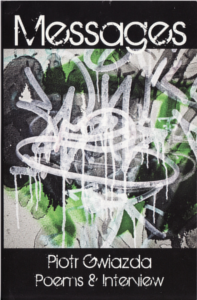Fall 2012
Table of Contents - Vol. VIII, No. 3
Poetry Fiction Translations Reviews
Dan Cuddy
Piotr Gwiazda,
Messages, ISBN 978-0-9719741-2-8, Pond Road Press, Washington, D.C. / North Truro, Massachusetts, 2012, 82 pages, $16.00.
When first reading Piotr Gwiazda’s book Messages, I was attracted to the poems but there was an air of mystery about them. The impression I had was of Bauhaus furniture or perhaps a Kandinsky painting. There is an interesting illustration on the cover of the book but its abstract expressionism with its dried drips of white paint is not at all like the clean language of Gwiazda’s poems. I had talked to a few people and they found the poetry difficult but actually it isn’t difficult poetry. The poet’s vision is just original. Many American poets write anecdotes or domestic scenes, or emphasize their intimate personal relationships, and many are interesting and novel poems, but Piotr Gwiazda, who is originally from Poland, emphasizes something entirely different.
This poet uses a subtle but not an impossibly subtle irony. The title may be “Messages” but the poet contradicts what this implies by his poems and in a 14 page interview which closes the book. The messages are not like the propaganda of a political convention or the claims of an advertising campaign. In section 6 of the Poet “Time” he writes
A creature of feelings
Rather than ideas, I prefer cities
To campuses, art to museums.
I prefer dreams to revolutions.
My poems are full of images
That occur to me in dreams.
I also prefer the body
And the new shoes it’s wearing
To (cough) metaphysics.
I never feel the same way twice.
I struggle to make my mark.
I write for myself or strangers.
And in prosaic terms a question by an interviewer and Gwiazda’s answer illustrates or backs up what he is saying in this poem and all the poems of the book:
I like the irony in titling your collection Messages while at the same time you as a teacher discourage your students from looking for messages in poems. How do you imagine your ideal reader proceeding with your poems?
In the same way I do when I read poems----always looking for the element of surprise…….I don’t think there are many poets who actually sit down to write a poem with a specific message. And yet….often the impulse is to look for messages, meaning, even wisdom in poems……Stevens (said)”When we find in poetry that which gives us a momentary existence on an exquisite plane, is it necessary to ask the meaning of the poem”? In the classroom (the poet teaches at the University of Maryland Baltimore County) I often cite T.S. Eliot’s famous burglar metaphor---the poem’s meaning serving as a mere diversion, a piece of meat for the guard dog, while the poem quietly “does its work” upon the reader. But what exactly is the poem’s “work”? That’s the real question.
Gwiazda answers that question provisionally with each of his poems. The interview is interesting and enlightening but the poems are the communion that the poet offers. They have an irrational breadth (emotion and chance experiences and observations) that are the ground structure but the discourse is understandable if you read the poet’s underlying design in them. Here is a short illustration that could throw readers of prose. The ultimate “meaning” is the inexpressible that is so real. This is from Section 1 of “Three Pieces For Two Hands” :
I’m walking across a parking lot
Soon to be replaced
By luxury condominiums.
To the right, a shopping cart.
To the left,
A dead squirrel.
My cellphone rings.
It’s good to hear your voice.
It is possible to look at the images as symbols but that misses the poetic experience. The experience is contained in the observations/feelings and pre-rational consciousness---the poetry, whatever that is. The poetry--- that is what this poet explores but not in a theoretical way! No, he is exploring poetry by writing poems and poetry isn’t the end all. The 19th and first half of the 20th century almost worshipped POETRY, but Gwiazda is like Toto in the wizard of Oz. He is revealing “poetry” in his poems as a natural experience, a gift of nature for us to use to view the everyday world and our dreams, for behind it all is arbitrariness. Logic, rational thought, prose communications are built on assumptions and beliefs that have no logical basis. In other words, at the heart of everything there is mystery.
I do not want to give the impression that the poetry in this book is dry discourse. That it is not! The poems are a wild adventure of possibility, but an educated, mature adventure. I’ll give the poet the last word as he answers an interview question.
In Messages I tried to account for the human capacity for “illusion”---those moments of clarity or confusion when things suddenly appear undistorted or unmediated; when we seem to move, quite irrationally, toward something other than ourselves. To give just a few examples: the surreal tableau in “Scenic Décor”; the dream of the end of the world in “Life After People”; the image of planetary exhaustion in “The Golden Age”; the quest for “a new dogma” in “Ghost Photography”; the fantasy of self-renewal in “Ohio and West”; the nightmare of disintegration in “Clouds Moving In.” I admit these illusions may also seem more like delusions; they are romantic, idiosyncratic, nutty.
© Dan Cuddy

